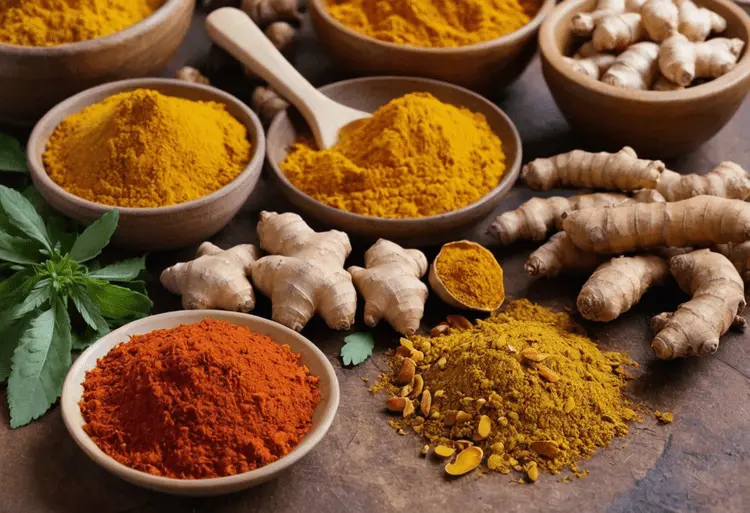Can lupus be cured with diet? It’s a question that echoes in the minds of many battling this chronic autoimmune condition. While the answer may not be what you hope for, the power of food in managing lupus is undeniable.
Ever felt like your diet could be the key to taming lupus flare-ups? Or wondered if there’s a magical “lupus diet” out there? You’re not alone!
The truth is, diet alone cannot cure lupus. However, the foods you choose to nourish your body can significantly impact your symptoms, inflammation levels, and overall well-being.
Join us as we unravel the complex relationship between diet and lupus. We’ll explore:
- The Truth: Why diet alone isn’t a cure, but still holds incredible power.
- The Science: Research-backed evidence on the best foods to eat and those to avoid.
- The Strategies: Practical tips for crafting a lupus-friendly diet that nourishes your body and soul.
Get ready to transform your plate and take charge of your lupus journey!
Diet & Lupus: The Short Story
- No cure, but helps manage.
- Mediterranean diet shines.
- Anti-inflammatory focus.
- Limit processed foods.
- Work with your doctor.
Table of contents
- Understanding Lupus and Nutrition
- Nourishing Your Body with Lupus-Friendly Foods
- The Mediterranean Miracle: Can a Diet Help Tame Lupus?
- Supplements and Lupus: A Helping Hand or Hype?
- Creating a Lupus-Friendly Lifestyle: Your Path to Empowerment
- Partnering for Success:
- Your Burning Questions About Diet & Lupus
Understanding Lupus and Nutrition

Can lupus be cured with diet ? What is Lupus?
Ever felt like your body is at war with itself? That’s a daily reality for people with lupus, a chronic autoimmune disease. In lupus, the immune system mistakenly attacks healthy tissues and organs, leading to inflammation and damage.
Common Symptoms and Impact on Daily Life
Lupus isn’t a one-size-fits-all disease. Symptoms can range from fatigue and joint pain to skin rashes and kidney problems. These symptoms can flare up and then subside, making life with lupus a rollercoaster of unpredictability.
The Lupus Foundation of America provides a wealth of information on the diverse symptoms and their impact on daily living.
Inflammation: The Culprit Behind Lupus
At the heart of lupus is inflammation – a natural process that, when out of control, can wreak havoc on the body. Chronic inflammation is a key driver of lupus symptoms and long-term complications.
Current Treatment and the Role of Diet
While there’s no cure for lupus, medications can help manage symptoms and prevent flares. However, medications often come with side effects, and some people may not respond well to them. This is where diet comes in.
Can lupus be cured with diet? No, but research suggests that a healthy diet may help reduce inflammation, manage symptoms, and improve overall well-being for people with lupus. Learn more about the role of nutrition in lupus management at WebMD.
The Power of Nutrition
Imagine food as a powerful tool in your lupus management toolbox. Just as certain medications can dampen inflammation, so can certain nutrients.
Key Nutrients for Lupus
- Antioxidants: These powerful compounds help protect cells from damage caused by inflammation. Find them in colorful fruits and vegetables like berries, spinach, and kale.
- Omega-3 Fatty Acids: Found in fatty fish like salmon, these healthy fats have anti-inflammatory properties that may benefit people with lupus.
- Vitamin D: This sunshine vitamin plays a role in immune function and may help reduce lupus activity.
Balanced Anti-Inflammatory Diet
Rather than focusing on a single “superfood,” a balanced, anti-inflammatory diet is key for people with lupus. This means filling your plate with whole, minimally processed foods and limiting those that can trigger inflammation.
Your Turn
Have you noticed any connection between your diet and lupus symptoms? Share your experiences in the comments below or tag us on social media! We’d love to hear from you.
Nourishing Your Body with Lupus-Friendly Foods
Have you ever wondered if the answer to “Can lupus be cured with diet?” might lie in the colorful array of fruits and vegetables on your plate?
The truth is, while diet alone won’t cure lupus, certain foods can be powerful allies in managing your symptoms and overall well-being.
So, let’s dive into the world of anti-inflammatory superstars that could transform your relationship with food!
Anti-inflammatory Superstars: Your Nutritional Arsenal
These vibrant foods pack a punch against inflammation, a key player in lupus flare-ups:
- Fruits and Vegetables: Think blueberries, spinach, kale, and sweet potatoes. They’re bursting with antioxidants, vitamins, and fiber that help soothe your immune system.
Ever tried a kale smoothie or roasted sweet potatoes with a drizzle of olive oil? Share your favorite recipes with us in the comments! - Whole Grains: Oats, quinoa, brown rice, and whole-wheat bread are not only delicious but also provide sustained energy and valuable nutrients.
Swap those refined grains for whole-wheat versions and see how you feel. A small change can make a big difference! - Healthy Fats: Avocados, nuts, seeds, and olive oil are rich in omega-3 fatty acids, known for their anti-inflammatory properties.
Did you know that a sprinkle of flaxseeds on your yogurt or a handful of walnuts as a snack can do wonders for your health? - Lean Protein: Fish, chicken, beans, and lentils provide essential amino acids for tissue repair and a steady stream of energy without triggering inflammation. Which protein sources are your go-to?
Nutritional Information for Health-Conscious Readers
Let’s talk numbers! Here’s a glimpse into the nutritional powerhouses you’ll be enjoying:
| Food | Nutrients of Interest | Why They Matter for Lupus |
| Blueberries | Antioxidants (anthocyanins) | Combat inflammation and protect cells |
| Kale | Vitamins A, C, K, Fiber | Boost immunity and reduce oxidative stress |
| Quinoa | Protein, fiber, magnesium, iron | Supports energy levels and overall health |
| Salmon | Omega-3 fatty acids | Powerful anti-inflammatory |
| Lentils | Protein, fiber, folate | Aid in cell repair and energy production |
Feel free to share your thoughts and experiences in the comments below! We’re excited to hear how you’re incorporating these anti-inflammatory superstars into your diet.
The Mediterranean Miracle: Can a Diet Help Tame Lupus?

Ever heard of the Mediterranean diet? It’s not just about delicious food; it’s a lifestyle linked to incredible health benefits. But can it really help people with lupus?
The Mediterranean Diet: A Symphony of Flavor and Health
Picture this: sun-drenched landscapes, vibrant fruits and vegetables, fresh fish, and heart-healthy olive oil. That’s the Mediterranean diet in a nutshell.
Beyond its culinary appeal, research suggests it might be a powerful ally for those of us navigating the challenges of lupus.
Inflammation Fighter: The Diet That Cools the Fire
So, what’s the magic? Well, the Mediterranean diet is packed with anti-inflammatory superstars like omega-3 fatty acids, antioxidants, and fiber. These nutrients work together to calm the flames of inflammation, a key player in lupus flare-ups.
But here’s the thing: while diet can significantly improve your quality of life and manage symptoms, it’s important to understand that lupus cannot be cured with diet alone.
A comprehensive approach that includes medical care, lifestyle changes, and potentially dietary adjustments is essential.
A Plate Full of Possibilities:
Think colorful salads bursting with veggies, whole-wheat pasta tossed with herbs and olive oil, grilled fish seasoned with lemon and garlic, and a juicy slice of watermelon for dessert. Sounds delicious, right?
Not only are these meals mouthwatering, but they’re also packed with nutrients that can help you feel your best.
Supplements and Lupus: A Helping Hand or Hype?
Ever wondered if that bottle of turmeric or fish oil could be your secret weapon against lupus flares? Or maybe you’ve heard whispers about vitamin D being a game-changer?
Supplements can be a confusing world, especially when you’re managing a complex condition like lupus. But don’t worry, we’re here to break it down for you.
The Lowdown on Supplements and Lupus
So, can lupus be cured with diet alone? The truth is, there’s no magic pill or potion that can completely cure lupus. But a balanced diet, along with the right supplements, may help manage symptoms and improve your overall well-being.
Remember, supplements are not a replacement for conventional medical treatment. Always consult with your doctor before starting any new supplement regimen, as they may interact with your medications or have unintended side effects.
Navigating the Supplement Aisle: Popular Choices for Lupus
Wondering which supplements might be worth exploring? Here are a few popular options for people with lupus:
- Turmeric (Curcumin): This golden spice is known for its powerful anti-inflammatory properties. Some studies suggest it may help reduce joint pain and swelling in lupus patients.
- Fish Oil (Omega-3 Fatty Acids): These healthy fats have been shown to reduce inflammation and may help improve heart health, which is particularly important for people with lupus who are at increased risk of cardiovascular disease. Want to learn more? Dive into this insightful article on WebMD about Nutrition and Lupus.
- Vitamin D: Research suggests that many people with lupus have low levels of vitamin D, which may contribute to disease activity. Supplementing with vitamin D may help improve symptoms and reduce flares.
- Probiotics: These “good” bacteria may help regulate the immune system and reduce inflammation. Some studies suggest they may be beneficial for people with lupus. Learn more about the role of diet and lupus in The Lupus Foundation of America’s Expert Series on diet and lupus.
Dosage, Side Effects, and Nutritional Considerations
While supplements may offer potential benefits, it’s important to be aware of the following:
- Dosage: The appropriate dosage can vary depending on the specific supplement, your individual needs, and any underlying health conditions. Always follow your doctor’s recommendations.
- Side Effects: Some supplements may cause side effects or interact with medications. Be sure to discuss any potential risks with your healthcare provider.
- Nutritional Information: For health-conscious individuals, it’s important to read labels carefully and choose reputable brands. Look for supplements that are free of fillers, additives, and artificial ingredients.
Share Your Thoughts! Have you tried any supplements for lupus? Share your experiences in the comments below or tag us on social media. Let’s create a community of support and knowledge!
Creating a Lupus-Friendly Lifestyle: Your Path to Empowerment
Tired of feeling like lupus controls your life? Want to take charge of your health and well-being? Good news: embracing a lupus-friendly lifestyle is entirely possible. And yes, that includes your diet.
Is a cure for lupus possible through diet alone? While there isn’t a magic food cure, research shows that dietary changes can play a significant role in managing symptoms, reducing flare-ups, and improving your overall quality of life.
It’s about embracing foods that nourish your body and avoiding those that trigger inflammation.
Meal Planning Made Easy: Your Flavorful Ally
So, what does a lupus-friendly meal plan look like? Picture vibrant plates filled with fruits, vegetables, whole grains, and lean protein sources. Think colorful salads drizzled with olive oil, hearty lentil soups, and baked salmon with roasted vegetables.
Sounds delicious, right?
But how do I find the time and energy to cook healthy meals? We get it. That’s why we’ve got you covered with easy, anti-inflammatory recipes and time-saving meal prep tips. Check out the Lupus Foundation of America’s Expert Series on diet and lupus for inspiration and guidance.
Nutritional Nuggets: Fueling Your Body
Curious about which nutrients pack the biggest punch for people with lupus? Omega-3 fatty acids found in fatty fish, flaxseeds, and walnuts help reduce inflammation.
Antioxidants in berries, leafy greens, and colorful veggies protect cells from damage. Vitamin D, whether from sunlight or supplements, supports immune function and bone health.
And don’t forget fiber! Whole grains, legumes, fruits, and veggies keep your gut happy and healthy. A healthy gut microbiome is essential for overall well-being.
Overcoming Obstacles: You’ve Got This!
Let’s be real: sticking to a new diet isn’t always easy. Fatigue, medication side effects, and just plain old cravings can throw you off track. But don’t give up!
Need some extra support? Connect with a registered dietitian who specializes in lupus. They can help you create a personalized meal plan, navigate challenges, and celebrate your successes. You can also find a wealth of information and support from organizations like WebMD. Remember, you’re not alone in this journey.
Partnering for Success:

When managing a complex condition like lupus, do you ever feel like you’re navigating a maze?
With so much information (and misinformation!) out there, it’s easy to get overwhelmed. That’s where your healthcare team comes in – your personal guides through the world of lupus and nutrition.
The Dream Team: Assembling Your Support System
Your healthcare team isn’t just your doctor. It’s a multidisciplinary group of experts, each with a unique role to play in your well-being. This could include:
- Your Rheumatologist: The captain of your lupus care, overseeing your overall treatment plan and medication management.
- A Registered Dietitian: Your nutrition expert, who can help you tailor a diet plan that aligns with your lupus goals and individual needs.
- Other Specialists: Depending on your specific symptoms, you might also work with a nephrologist (kidney specialist), dermatologist, or mental health professional.
The Power of Personalized Nutrition
Remember, there’s no one-size-fits-all diet for lupus. What works for one person might not work for another. That’s why personalized nutrition is key. To learn more about this personalized approach.
By collaborating with a registered dietitian, you can create a meal plan that takes into account:
- Your specific lupus symptoms: Are you experiencing fatigue, joint pain, or skin rashes? Certain foods might help alleviate these issues.
- Your medication: Some foods can interact with lupus medications, so it’s important to factor this into your diet plan.
- Your food preferences and lifestyle: A sustainable diet is one you actually enjoy and can stick with long-term.
Nutrition: Your Secret Weapon Against Lupus
A well-balanced diet, rich in anti-inflammatory foods and nutrients, can play a significant role in managing lupus symptoms and improving your overall quality of life. In fact, some research suggests that a healthy diet may even help reduce the need for certain medications.
Want to dive deeper into the connection between nutrition and lupus? Check out WebMD – Nutrition and Lupus for evidence-based information and practical tips.
Your Journey, Your Way
Remember, can lupus be cured with diet? The answer isn’t a simple yes or no. While diet alone can’t cure lupus, it can be a powerful tool in your arsenal.
Have you found success with a particular diet or food that helps manage your lupus? We’d love to hear about it! Share your experiences in the comments below or tag us on social media.
Ready to move beyond the basics of “Can lupus be cured with diet?” Dr. Goldner’s Protocol offers a deeper dive into how nutrition can radically transform your lupus journey. Discover a proven approach to managing symptoms and reclaiming your health.
Your Burning Questions About Diet & Lupus
No, lupus is a chronic condition without a known cure. However, periods of remission are possible with proper management.
The immune system in lupus mistakenly attacks healthy tissue. While it can’t “heal” itself, treatments aim to calm this overactive response.
While there’s no cure, many people with lupus live full lives through medication, lifestyle changes, and attentive medical care.
Working closely with your doctor, adhering to prescribed medications, adopting a healthy lifestyle including diet and exercise, and managing stress are key to slowing lupus progression.
Sadly, no. But a balanced diet is like a trusty sidekick, helping you manage symptoms and feel your best.
No single diet fits all, but research suggests the Mediterranean diet may be particularly beneficial. Learn more in this article from The Lupus Foundation of America.
Common culprits include refined sugars, processed foods, saturated fats, and sometimes nightshade vegetables.
Yes! Load up on colorful fruits and veggies, whole grains, lean protein, and healthy fats. They’re your inflammation-fighting squad!
Some, like fish oil, vitamin D, and turmeric, show promise. But always talk to your doctor first. WebMD offers helpful guidance.
Swap sugary drinks for water, add more veggies to your meals, or try an anti-inflammatory recipe.